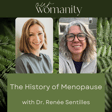
10. Perimenopause: Identity Shift with Sundae Bean
In this episode of Our Womanity features a conversation with Sundae Bean, a transformation facilitator who supports individuals and organizations as they traverse through life quakes and other major shifts. A trusted voice for navigating life between worlds, Sundae is currently dedicated to organizational transformation in Switzerland and is widely known for her podcast, IN TRANSIT.
Perimenopause: A Biological Transition
Sundae explains perimenopause as an externally led transition—something that happens to you, not something you choose. This can overlap with other life transitions:
- Internally Led: Changes that come from within.
- Performance Led: Pursuing a big goal, like a promotion.
- Externally Led: Changes that come from our environments.
She emphasizes the importance of distinguishing between a genuine emotional response and a biochemical one, noting that while feelings are real, their source may be hormonal rather than a true reflection of your reality.
Strategies for Navigating Hormonal Shifts
Sundae offers practical advice to help manage symptoms like "monkey mind":
- Reality Check and Blood Check: Use this dual approach to test what's truly going on. Talk to a trusted friend to get an outside perspective, and work with your doctor to get yourself evaluated .
- Trust Your Body: Sundae shares her own experience of listening to her body's "yummy yes" for yoga over a "hard no" for running. This highlights the importance of trusting your body's needs over external advice.
- Find Your Body Compass: To counter feeling out of control, she suggests a simple exercise: take three deep breaths and hold the fourth until you can feel your own heartbeat. This grounds you and gets you out of your head.
Perimenopause as a Growth Opportunity
While difficult, perimenopause can be a time for growth.
- Self-Advocacy: It may force you to become your own best advocate, taking charge of your health when the system feels unsupportive.
- Adapting Strategies: Acknowledge that old strategies might not work now. A coach can help you develop new approaches.
- Bending Reality: Sundae encourages listeners to honestly assess where they might be "bending reality"—acting as if there are more than 24 hours in a day. This awareness is the first step toward delegating and prioritizing.
Advice for Healthcare Providers
Sundae offers advice for healthcare providers to better support their patients.
- Listen to the Patient: Ask, "How have you been?" to understand the full context of their life.
- Validate Their Experience: Don't dismiss symptoms. A simple, "That sounds hard," can be incredibly validating.
Refer When Needed: If you cannot provide the necessary care, refer patients to a coach or other specialist.



















